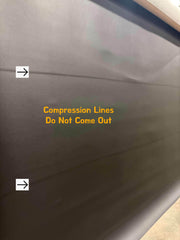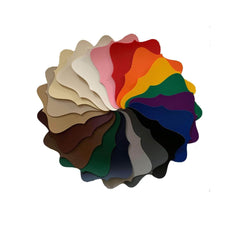
Choosing the Right Vinyl Gauge for Porch Windows, Greenhouses, and More
Selecting the correct vinyl gauge for outdoor applications like porch windows, greenhouses, and patio enclosures is essential for ensuring durability, clarity, and weather resistance. Homeowners and business owners often struggle with choosing the right thickness, which can lead to premature wear, poor insulation, and costly replacements.
This guide will help you understand vinyl gauge measurements, the best options for different applications, and key factors to consider before making a purchase.
Understanding Vinyl Gauge
What is Vinyl Gauge?
Vinyl gauge refers to the thickness of plastic sheeting used in outdoor enclosures, measured in thousandths of an inch. A higher gauge means thicker material, providing greater durability and insulation but reducing flexibility.
Common Vinyl Gauge Ranges
-
4-8 Gauge (0.004 - 0.008 inches): Extremely thin and flexible, suitable for lightweight applications, table covers and packaging..
-
10-20 Gauge (0.01 - 0.02 inches): Ideal for manufactured porch windows (Porch Window Direct, Metro Screen Works, MaestroShield, Eze-Breeze windows), enclosures and lanais using spline securement systems.
-
30-40 Gauge (0.03 - 0.04 inches): Ideal for porch enclosures and patio curtains using screw and washer, wrapped wood frame windows or grommeted securement systems. This thickness offers increased durability and weather resistance.
-
60-80 Gauge (0.06 - 0.08 inches): Heavy-duty protection, best for extreme weather conditions.
Why Gauge Matters
Choosing the right vinyl thickness impacts:
-
Durability: Thicker vinyl withstands harsh conditions better.
-
Transparency: Thinner vinyl provides clearer views.
-
Weather Resistance: Higher gauges offer better insulation and UV protection.
-
Ease of Installation: Lighter gauges are easier to handle and install.
Recommended Vinyl Gauges for Specific Uses
Porch Windows
For porch enclosures, selecting the right vinyl thickness is critical for maintaining visibility while protecting against wind and rain.
-
10-20 Gauge: Provides a balance between flexibility and durability.
-
30-40 Gauge: Offers enhanced strength and insulation for year-round use.
-
60-80 Gauge: Heavy-duty protection for extreme weather areas.
Marine-grade UV-resistant vinyl is recommended to prevent fading and cracking from sun exposure.
Greenhouses
Greenhouse vinyl must allow sufficient light transmission while providing insulation.
-
10-40 Gauge: Maintains warmth and allows optimal light penetration.
Choosing UV-resistant vinyl prevents discoloration and prolongs the material’s clear lifespan.
Patios & Outdoor Enclosures
For patio spaces that require weather protection without obstructing views:
-
10-20 Gauge: Best for lightweight patio curtains and spline systems.
-
20-40 Gauge: Provides better strength, durability, insulation and wind resistance.
-
60-80 Gauge: Ideal for permanent enclosures in harsh climates.
High-gauge vinyl also adds soundproofing benefits, making it suitable for urban areas.
Factors to Consider When Choosing Vinyl Gauge
1. Weather Conditions
The local climate determines the best vinyl gauge for your project.
-
Windy Areas: Opt for 40+ gauge for better resistance.
-
Cold Climates: 30-40 gauge vinyl withstands freezing temperatures.
-
High UV Exposure: Marine clear vinyl is UV-resistant and prevents sun damage.
2. Transparency Needs
-
Clear vinyl: Allows maximum visibility, ideal for porch windows and when an alternative to glass is needed.
-
Semi-transparent vinyl: Provides some tinted privacy while maintaining light transmission. Frosted vinyl provides maximum privacy while still awning some light to pass through.
3. Tear and Wear Resistance
Higher gauge vinyl is more resistant to tearing, punctures, and daily wear. If using vinyl in heightened weather areas, opt for 30-80 gauge to ensure longevity.
4. Flexibility and Weight
Thicker vinyl is heavier and may require stronger mounting hardware. If frequent adjustments are needed, consider a lower gauge for easier handling.
Installation Tips for Vinyl Sheets and Tarps
1. Proper Measurement and Cutting
-
Measure the installation area twice to ensure accuracy.
-
Use a straight edge and marker to create precise cutting lines.
-
Use heavy-duty scissors or a utility knife for clean cuts.
2. Securing with Grommets and Fasteners
-
Space grommets 6-18 inches apart for even weight distribution. The closer the distance the more spread out the stress forces will be from wind and rain etc providing a longer lasting hold.
-
Use brass or stainless steel grommets and hardware to prevent corrosion issues.
-
Secure with snap hooks, rope ties, or industrial clips for a strong hold. Secure taught but not overly tight.
3. Ensuring a Tight and Durable Fit
-
Stretch vinyl properly to prevent sagging.
-
Check tension regularly to avoid damage during temperature fluctuations.
-
Use reinforced edges to prevent tearing at attachment points.
Maintenance and Care for Vinyl
1. Cleaning for Longevity
-
Use mild soap and water to clean dirt and stains.
-
Avoid abrasive cleaners that can scratch the surface.
-
Rinse with a garden hose to maintain clarity.
2. Preventing Damage
-
Keep sharp objects away from vinyl surfaces.
-
Store properly to prevent warping and mold buildup.
-
Wash to remove dirt and mineral buildup to maintain clarity.
3. Storage Tips for Off-Season Use
-
Roll vinyl instead of folding to prevent creases.
-
Store in a cool, dry location, preferably climate controlled space.
-
Keep away from extreme temperature fluctuations, attics, garage and sheds.
Common Mistakes to Avoid When Selecting Vinyl Gauge
1. Overlooking Weather Compatibility
Choosing the wrong gauge for local weather conditions can lead to material failure. Always consider wind, UV exposure, and temperature fluctuations when selecting vinyl.
2. Choosing the Wrong Thickness for the Application
-
Too Thin: More prone to tearing and poor insulation.
-
Too Thick: May be unnecessarily heavy and difficult to install.
3. Ignoring Manufacturer Specifications
Manufacturers provide specific recommendations for proper use. Ignoring these guidelines may lead to improper installation, reduced lifespan, and voided warranties.
Benefits of Using the Right Vinyl Gauge
1. Enhanced Durability
Selecting the correct gauge ensures the vinyl lasts longer, reducing replacement costs.
2. Improved Aesthetic Appeal
Clear vinyl enhances outdoor spaces by maintaining visibility while offering protection.
3. Cost-Effectiveness in the Long Run
Higher-quality vinyl requires fewer replacements and less maintenance, saving money over time.
Conclusion
Choosing the right vinyl gauge is crucial for durability, weather protection, and energy efficiency. Whether you're enclosing a porch, setting up a greenhouse, or installing patio curtains, selecting the appropriate thickness ensures optimal performance and long-term savings.
By considering climate, durability, and transparency needs, you can invest in vinyl that enhances your outdoor spaces while providing lasting protection.
FAQs
1. What gauge vinyl is best for porch enclosures?
For porch enclosures, 20-40 gauge provides excellent durability and weather resistance while maintaining clarity.
2. How do clear vinyl enclosures save energy?
Vinyl enclosures act as insulators, reducing heat loss in winter and keeping spaces cooler in summer.
3. What hardware is needed for installing patio curtains?
Grommets, zipper splits, and mounting brackets ensure a secure and functional installation.
4. Can retractable vinyl enclosures withstand extreme weather?
Yes, 60-80 gauge vinyl provides superior resistance to wind, rain, and UV exposure.
5. Why should I invest in UV-resistant vinyl?
UV-resistant vinyl prevents yellowing, cracking, and sun damage, extending the lifespan of your outdoor enclosures.







Leave a comment
This site is protected by hCaptcha and the hCaptcha Privacy Policy and Terms of Service apply.